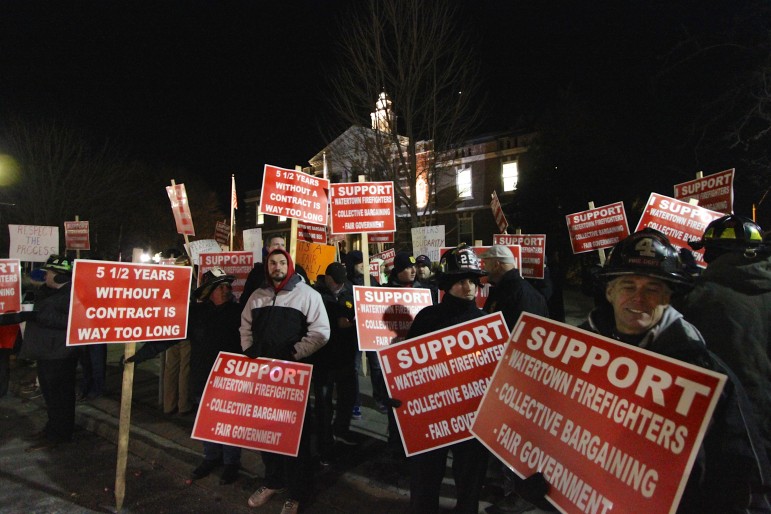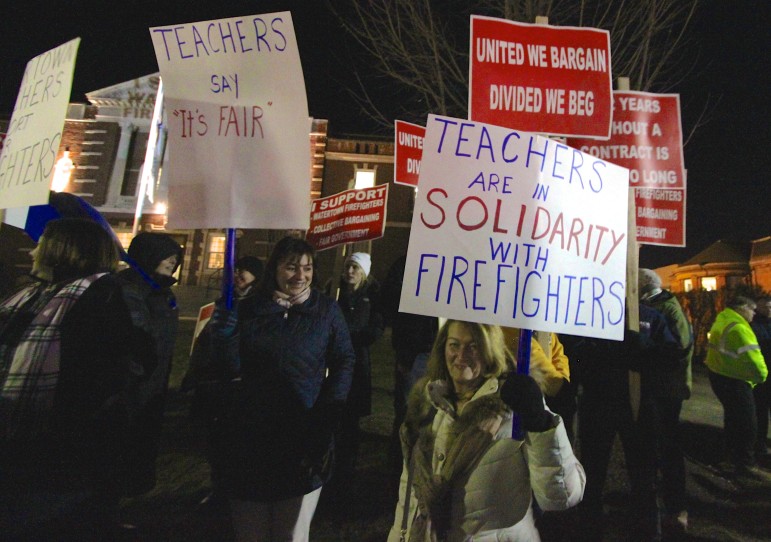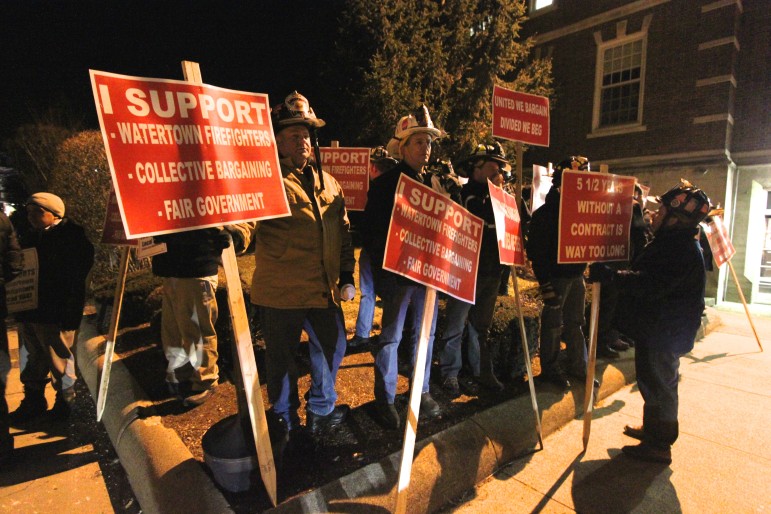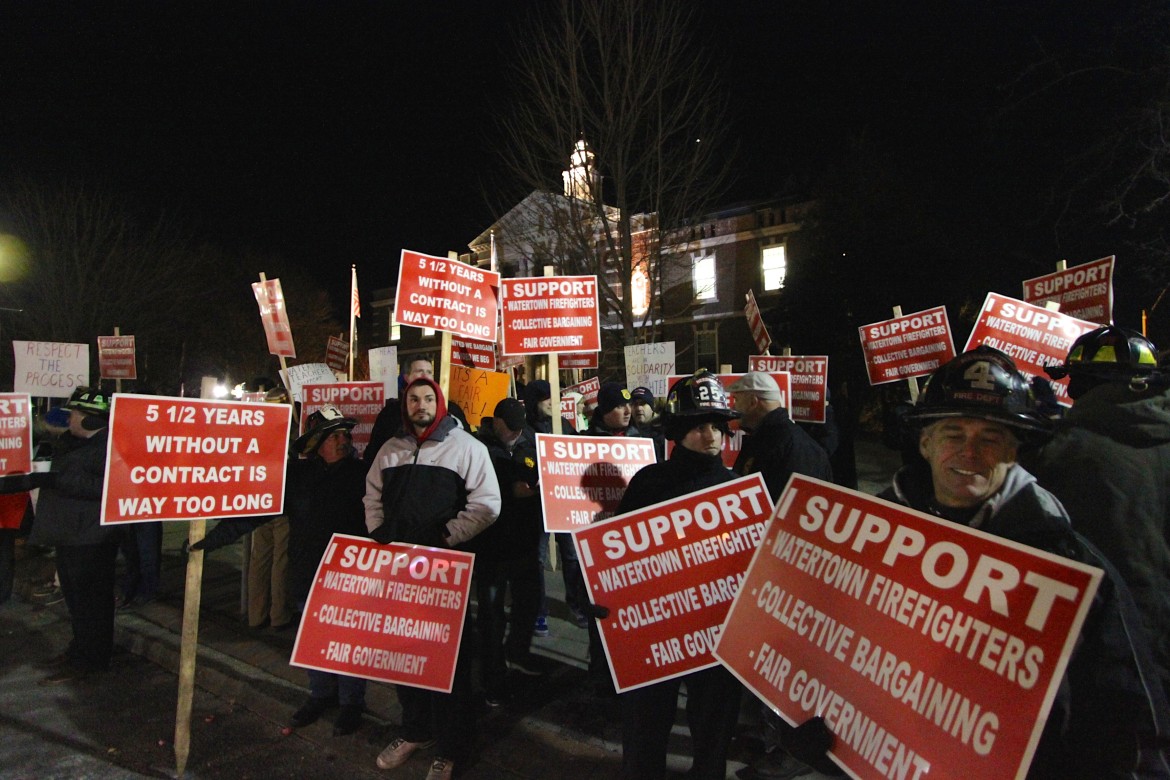
Charlie Breitrose
Nearly 400 people rallied in front of Town Hall in support of the Watertown Firefighters.
Labor unions had a strong showing in front of Watertown Town Hall Tuesday night before the Town Council meeting, but councilors did not reverse their decision to reject an award for the town’s firefighters approved by a state arbitrator.
The rally came about after 8 of 9 Town Councilors voted to reject the arbitration agreement on Dec. 9, saying that the proposal that included 2.5 percent raises in Fiscal 2012 and 2013 and an increase for EMT training and would cost the town $2.74 million in back pay. Firefighters have been without a contract for more than 5 1/2 years.
The deadline to file to reconsider the vote on the contract passed before Tuesday’s meeting, said Town Council President Mark Sideris. A councilor who voted to reject the contract would have had to file to reconsider by noon on the day following the meeting, he said.
Sideris said the fire contract has become one of the biggest issues in recent years, at least as big as the proposal to put artificial turf on the Victory Field track. When he spoke to residents he said he echoed the Town Council saying that the contract was not fair to other unions in town.
“I told them it’s a matter of the contract not being equal to what other employees got,” Sideris said.
Sideris said he hopes that town officials and the fire union can restart negotiations and come to an agreement soon.
The other town and school unions agreed to take no raises in Fiscal 2010 and 2011 as the town dealt with the economic downturn. They got 2.5 percent raises in 2012 and 2013. The arbitration award would have had the same raises, or lack there of, but firefighters were given an increase in EMT training.
Firefighters have been training for and implementing new skills – such as using Narcan, and antidote for heroin overdoses – without negotiating it in the contract, said Rob Mannix, president of Local 1347 -the Watertown fire union. The EMT increase would account for this training, he said.
Mannix told the Council that leaders of the other unions in town support approval of the firefighters’ contract. He presented a letter signed by Police Association, Police Supervisors, the Watertown Education Association, SEIU Town Hall Associates and the Custodians and Food Services Workers. After the letter was sent to the Council, Mannix said he also got pledges of support from the presidents of the local Teamsters who represent Public Works employees, and the library workers.
Whether the town can afford to pay for the contact was an issue of debate. About 400 people came out for the rally holding signs asking the Council to fund the contract. Firefighters from around Massachusetts, and as far as Texas came to the rally. They were joined by members of the Massachusetts Teachers Association from Watertown, Belmont and Waltham, the Police union, members of SEIU and other supporters.

Charlie Breitrose
Members of the Massachusetts Teachers Association came out to support the Watertown Firefighters, including Watertown Education Association President Debra King, right.
Members of Local 1347, the Watertown Fire Union, have said the arbitration was decided by a neutral panel and the only way the Council can reject it is if the town does not have the resources to fund it.
Town Manager Michael Driscoll said the Council can consider other reasons for rejecting the arbitration award, besides just the town’s ability to fund it.
“As the local appropriating body for the Town of Watertown, one of the Town Council’s primary responsibilities in general is to decide how the Town’s limited tax dollars will be spent and to what degree,” Driscoll said. “Unlike what some have suggested, however, the Town Council was not legally obligated to simply rubber stamp the arbitrator’s award.”
Sideris said the potential impact of the contract on other parts of Watertown’s budget was not part of the calculations.
“That is not even part of the discussion,” Sideris said. “As they said, the town has the money to pay for it.”
Deputy Chief Bob Quinn has worked for the Watertown Fire Department for 28 years, and he is the fourth generation of his family to work for the town. He told the council that the way the fire union is being treated has changed his view toward the town.
“The way you are treating the bargaining process is disrespectful. You are not bargaining in good faith, and it is a complete insult to the firefighters, town employees and the citizens of Watertown,” Quinn said. “Being a Watertown Firefighter is a job a love, and provides great satisfaction, but I am no longer happy to say I am from Watertown, Massachusetts.”

Charlie Breitrose
Firefighters hold signs outside Town Hall to request the fire contract be settled.
The Council’s vote hurt not only the Watertown Firefighters, but collective bargaining in general, said Ed Kelly, president of the Professional Fire Fighters of Massachusetts.
“This case, the council’s position on the arbitration award isn’t about the Watertown firefighters. Collective bargaining is the cornerstone of what built middle class in this country,” Kelly said. “The vote you made threw the concept out the window.”
The council’s decision will be looked at closely by members of the state fire union and others, said Bob McCarthy, a retired Watertown firefighter who is active in the state firefighter association.
The Joint Labor-Management Committee – which oversees contract disputes in Massachusetts – has already started examining the Town Council’s vote, McCarthy said, and the union will work with members of the Middlesex District Attorney’s office and the Massachusetts Attorney General’s office to make sure everything was done legally.

Solition: raise taxes, fund the schools to reduce class sizes, pay the firefighters and cops, plant trees… Watertown has lots of potential – let’s spend some money to make it great!!